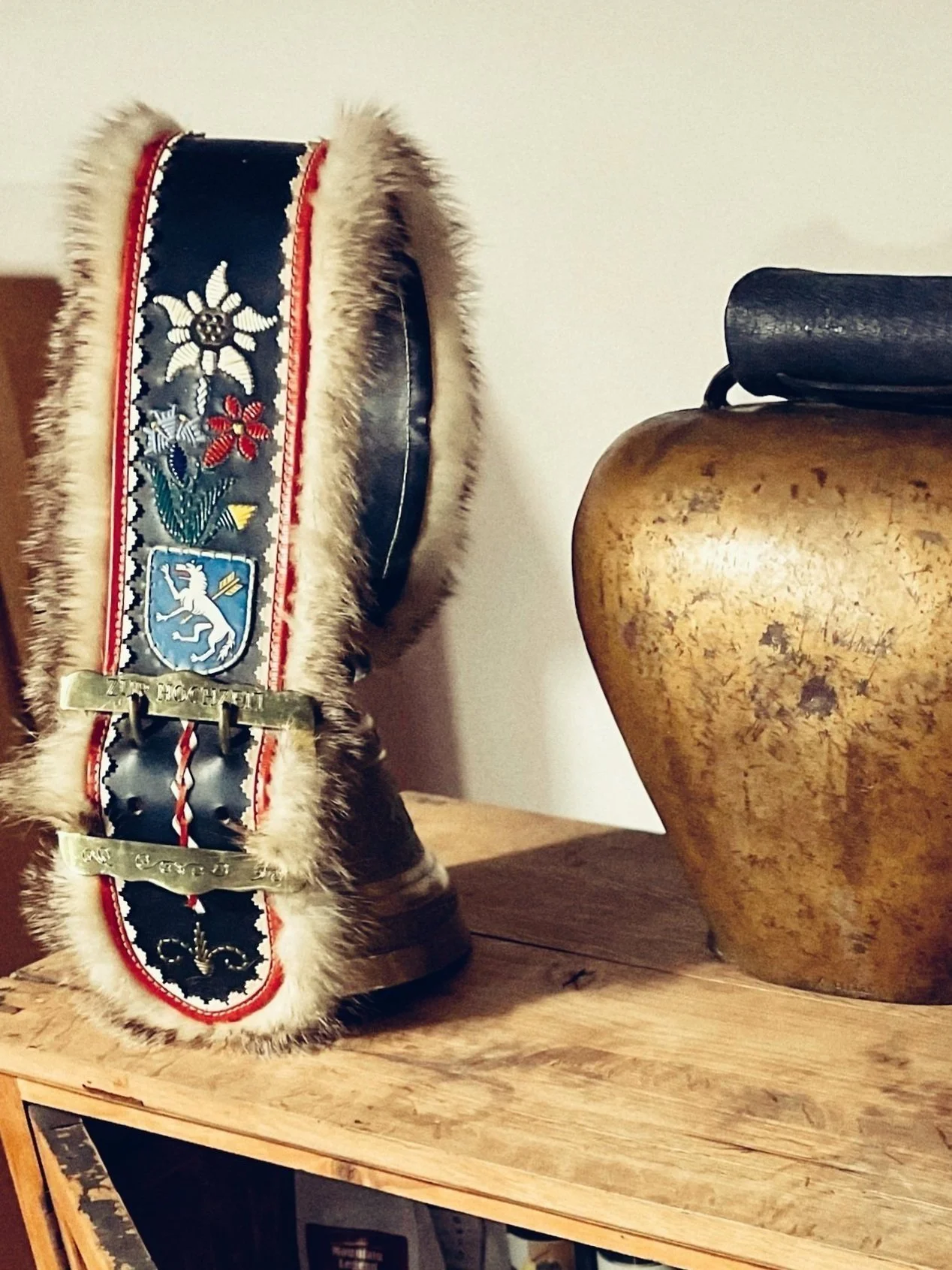The Curious Life of Cowbells: Lost in Translation
Something magical happens in our little corner of Donglongwan Village (東龍灣村). Between mountains on three sides and an open western village vista, our Swiss bells have found an unexpected second life.
Each guest room hosts a genuine Swiss bell — silent sentinels of Alpine heritage. Our West Room showcases the pride of our collection, which inspired our cottage name "Cowbell."
What I never expected was how these simple instruments would spark a global conversation about... sound.
The Sound of Music (Or Is It?)
"What sound," I innocently asked one evening, "would you say a proper Swiss cowbell makes?"
This seemingly simple question unleashed passionate debate among our international visitors.
One of our Swiss friends offered "bimbam" with the confidence of someone raised within earshot of these instruments. "A proper Swiss bell has a 'bimbam' that rises and falls like a complete sentence," he explained with precision reminiscent of a master chocolatier describing the perfect truffle.
Our Italian guests suggested "peal" and "chimes" with characteristic musicality. There's something beautiful about hearing cowbells described with such lyrical appreciation.
A Minor Confusion of Tongues
Among the eager onomatopoeia suggestions, then came whispered revelations about English terminology.
"Just so you know," a Canadian visitor mentioned over dinner, "in North America, 'dong' sometimes has... other meanings." His smirky expression told me everything.
A British friend confirmed that 'donk' likewise carries unintended associations in UK slang.
"Perhaps 'clonk'?" suggested an Australian. "Or 'tonk'? Though that sounds like cricket."
I briefly considered abandoning all English sound-words before realizing that would make conversation rather difficult.
Eastern Harmony
Our Hong Kong visitors bring the Cantonese "噹" (dong) — a character combining the "metal" radical with phonetic elements suggesting resonance.
Their eyes light up when they encounter our Swiss bells, exclaiming "噹噹!" with infectious delight — as if discovering an old friend in an unexpected place.
One gentleman spent an afternoon moving from bell to bell, ringing each with careful attention. "Good 噹," he'd declare, or "Perfect 噹噹” — a mindful appreciation of sound transcending mere hearing.
The Heart Has Its Voices
Despite these alternatives, I remain oddly attached to "donk." When I listen to our Swiss bells — each carefully selected and transported across continents — "donk" is simply what registers in my mind.
A Chinese friend reminded us of the connection between sound and feeling. In Chinese, "meaning" (意/yì) evolved from the combination of "sound" (音) and "heart" (心). Meaning emerges precisely where sound meets heart.
My "donk" isn't just a sound description — it's the meaning my heart creates from the bell's voice. The Swiss "bimbam" isn't merely onomatopoeia — it's centuries of cultural resonance crystallized in a phrase.
Belts of Distinction
Our West Room collection features four bells, with more coming soon. Two arrived with exquisite straps telling stories all their own.
The first, our authentic Bernese cowbell, came from what the Swiss call a "Grossbauer" — a substantial landowner from the Canton of Bern. This bell's strap is a masterpiece of traditional embroidery, designed for a wedding ceremony. The patterns feature Switzerland's iconic alpine flowers — edelweiss, gentian, and alpine rose — symbolizing enduring love, resilience, and beauty.
"Such decorated wedding bells are presented to couples as symbols of harmony and prosperity," explained its former owner. "The sound is believed to bring good fortune to the marriage."
The second decorated bell, with beautiful wheat and barley motifs, reminds us of traditions from regions like Val Mustair, a remote valley in eastern Switzerland. While we're uncertain of this bell's exact origin, its craftsmanship speaks to Switzerland's diverse bell-making traditions.
A visitor familiar with Val Mustair explained how such remote regions maintain centuries-old traditions: "In isolated valleys, bells mark the rhythm of mountain life throughout the seasons. Their distinctive tones would have been recognizable to everyone in the village."
From Swords to Symphonies
Most of our bells were cast in specialized foundries — a precise art requiring exacting attention to achieve the perfect tone. Only our large yellow bell and one smaller piece were hand-hammered in the traditional way.
"While other nations turned their metal crafts toward weapons," explained a Swiss visitor, "our foundries perfected the art of creating harmonious sounds for everyday life."
As their tones echo across our fields, they remind us how Swiss heritage celebrates harmony and connection to the land.
The Resonance of Memory
One evening, a Swiss visitor sat silently on our porch, occasionally touching — but not ringing — one of our larger bells.
"This bell sounds exactly like my childhood," he finally said, explaining how the evening chorus of returning cowbells formed the soundtrack of his earliest memories.
When he finally swung the clapper, the bell's resonance seemed to collapse time itself. For a moment, he wasn't an adult in China but a child in Switzerland, running toward home as cows returned at dusk.
"Sound," he whispered, "carries memory better than photographs."
If you visit our Cowbell cottage, I hope you'll take a moment with these voice-carrying vessels. Each guest room offers its own Swiss bell, waiting for curious hands and attentive ears.
Ring it. Listen. What meaning forms between that sound and your heart?
Whether your mind translates that sound as "donk," "bimbam," "噹," or something entirely your own, I'd love to add your perception to our growing collection of bell-sounds-across-cultures.
What word best captures the sound of a cowbell in your language, dialect, or personal vocabulary? Share your suggestions, and together we'll create a global cowbell sound dictionary, mapping how these simple instruments speak across cultures.



